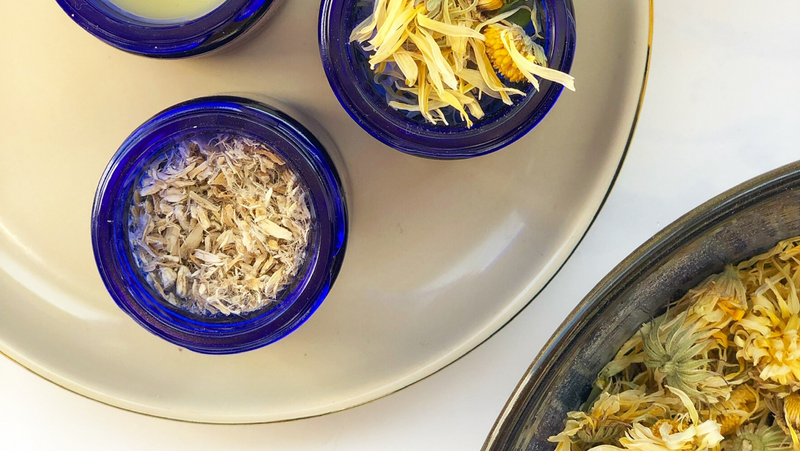We’re pleased to share the following information on herbs for labor and postpartum care, written by Motherlove founder Kathryn Higgins:
CAN I USE HERBS DURING LABOR? Yes, herbs can be very useful during labor and after birth to ease pain, calm emotions, and help speed recovery. The following herbs have been used by midwives and birthing women. See our section on plants for photos and more detailed information on several of these herbs. Many products using these herbs are available through Motherlove.
- Blue and black cohosh are two herbs that work synergistically to bring on labor (but do not use before the 39th week of pregnancy). During labor they can make contractions more efficient in a long, stalled labor, and help the uterus clamp down after birth.
- Raspberry leaf (tea or tincture) is one of the best uterine tonic herbs to prepare uterine muscles for efficient labor. Its astringent action slows bleeding and helps to expel the placenta. Have the tea on hand or make raspberry tea ice cubes to suck on during labor.
- Many herbs can help ease the pain of contractions: Take crampbark for uterine cramping during labor, and after birth to eliminate after birth cramping pains. Scullcap and catnip relieve pain, as well as calm and relax the body. Chamomile helps control pain during labor by relieving tension.
OTHER HERBS HELP WITH EMOTIONAL BALANCE DURING LABOR:
- Motherwort is one of the best herbs to give immediate emotional balance during the ups and downs of labor, but it may increase uterine bleeding.
- Rescue Remedy, a Bach flower remedy, is excellent for bringing one quickly into focus when under stress or shock during difficult labor. It can also be put on the baby’s forehead or wrist after a stressful birth.
- A massage oil, enhanced with herbs, will relax the muscles and ease back labor pain. Use relaxing, aromatic herbs such as chamomile, rose, and lavender. Rubbed on the perineum, it helps prevent tearing as the baby crowns and ease swelling and burning.
- Essential oils in massage oil or mister can give clarity and focus. Clary sage gives a sense of well being and combats mental fatigue. During birth it helps focus breathing and calm anxiety. Geranium essential oil balances emotions and works well for perineal massage, as it stimulates circulation. Lavender is calming and strengthening, relieving depression and irritability, and ideal in any blend for all skin types. Be sure that essential oils are used in a carrier oil or mister and not directly on the skin.
- Shepherd’s purse tincture is the best herb to quickly stop postpartum hemorrhaging. Every midwife should have it with her in case an emergency situation arises (read the dramatic story of how shepherd’s purse helped Kathryn during one of her births).
- After the birth, use a sitz bath on the perineum, heal any tears, shrink swelling, and slow bleeding. It helps the perineum to heal quickly, makes walking more comfortable, and feels so good! Herbs to use include comfrey, yarrow, uva ursi, witch hazel, shepherds purse, and garlic.
- Fill a plastic squirt bottle with a strong comfrey tea (or add calendula) to squirt on your perineum as you urinate to lessen any burning and heal tears.
- Homeopathic arnica pills, taken every few hours for several days after the birth, help reduce bruising and swelling of the perineal tissue. Be sure you are taking arnica internally only in homeopathic form, as arnica tincture prevents clotting and should not be taken internally.




